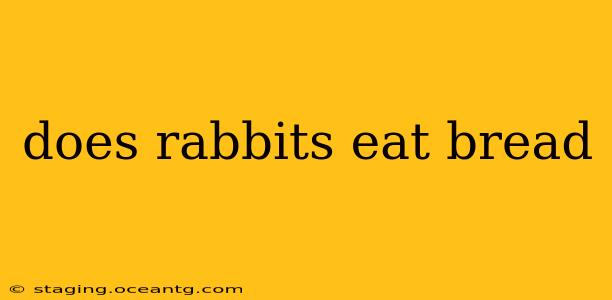The simple answer is no, rabbits should not eat bread. While a small piece might not immediately harm a healthy adult rabbit, bread offers little to no nutritional value and poses several risks to their health. This article delves deeper into the reasons why bread is unsuitable for rabbits and explores safer, healthier alternatives.
Why is Bread Bad for Rabbits?
Bread lacks the essential nutrients rabbits need for a balanced diet. Their digestive systems are highly specialized for a diet consisting primarily of hay, supplemented with fresh vegetables and a small amount of pellets. Bread, on the other hand, is high in carbohydrates and simple sugars, which can lead to several problems:
-
Obesity: The high carbohydrate content in bread contributes to weight gain, increasing the risk of obesity-related diseases. Obese rabbits are more susceptible to health issues like diabetes and heart problems.
-
Dental Problems: Bread's soft texture doesn't provide the necessary chewing action rabbits need to wear down their constantly growing teeth. This can lead to overgrown teeth, causing pain, difficulty eating, and potentially requiring veterinary intervention.
-
Digestive Issues: The high sugar content in bread can disrupt the delicate balance of the rabbit's gut microbiome, resulting in digestive upset, bloating, gas, and diarrhea. This can be especially problematic for young or sensitive rabbits.
-
Nutritional Deficiency: Bread provides minimal nutritional value compared to hay and fresh vegetables. Feeding bread regularly can lead to nutritional deficiencies, impacting overall health and well-being.
What Can Rabbits Eat Instead of Bread?
Rabbits thrive on a diet centered around unlimited access to high-quality grass hay (timothy, orchard, or meadow). This forms the foundation of their diet, providing essential fiber for digestion and dental wear. In addition to hay, offer a small amount of rabbit pellets (specifically formulated for rabbits) and fresh vegetables like:
- Dark leafy greens: Kale, romaine lettuce, spinach (in moderation)
- Other vegetables: Carrots (in moderation), bell peppers, cucumbers
Always introduce new foods gradually to avoid digestive upset. Avoid sugary treats and human foods like bread, which offer no benefits and can be harmful to your rabbit's health.
What if My Rabbit Accidentally Ate Bread?
A small, accidental nibble of bread is unlikely to cause severe harm to a healthy adult rabbit. However, monitor your rabbit closely for any signs of digestive upset, such as diarrhea, lethargy, or loss of appetite. If you notice any concerning symptoms, consult a veterinarian immediately.
How Much Hay Should My Rabbit Eat?
Hay should make up 80-90% of your rabbit's diet. Provide unlimited access to fresh, high-quality hay at all times. This ensures proper digestion, dental wear, and overall health.
Is Bread Toxic to Rabbits?
While not technically "toxic," bread is detrimental to a rabbit's health due to its lack of nutritional value and high carbohydrate content. It's best to avoid feeding bread to your rabbit altogether.
Can I Give My Rabbit Other Human Foods?
Generally, human foods should be avoided. Many common human foods are toxic or unhealthy for rabbits. Stick to a diet primarily consisting of hay, a small amount of pellets, and fresh vegetables. Always consult with a veterinarian or rabbit expert before introducing any new foods to your rabbit's diet.
By understanding the risks associated with feeding bread to rabbits and providing them with a proper diet, you can ensure your furry friend remains healthy and happy for many years to come. Remember, a balanced diet is crucial for a rabbit's well-being. Always consult a veterinarian or a rabbit-savvy expert for personalized dietary advice for your rabbit.
